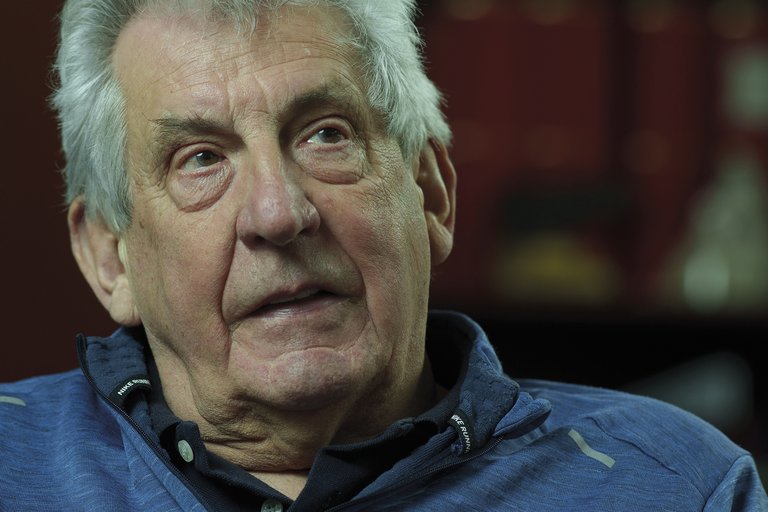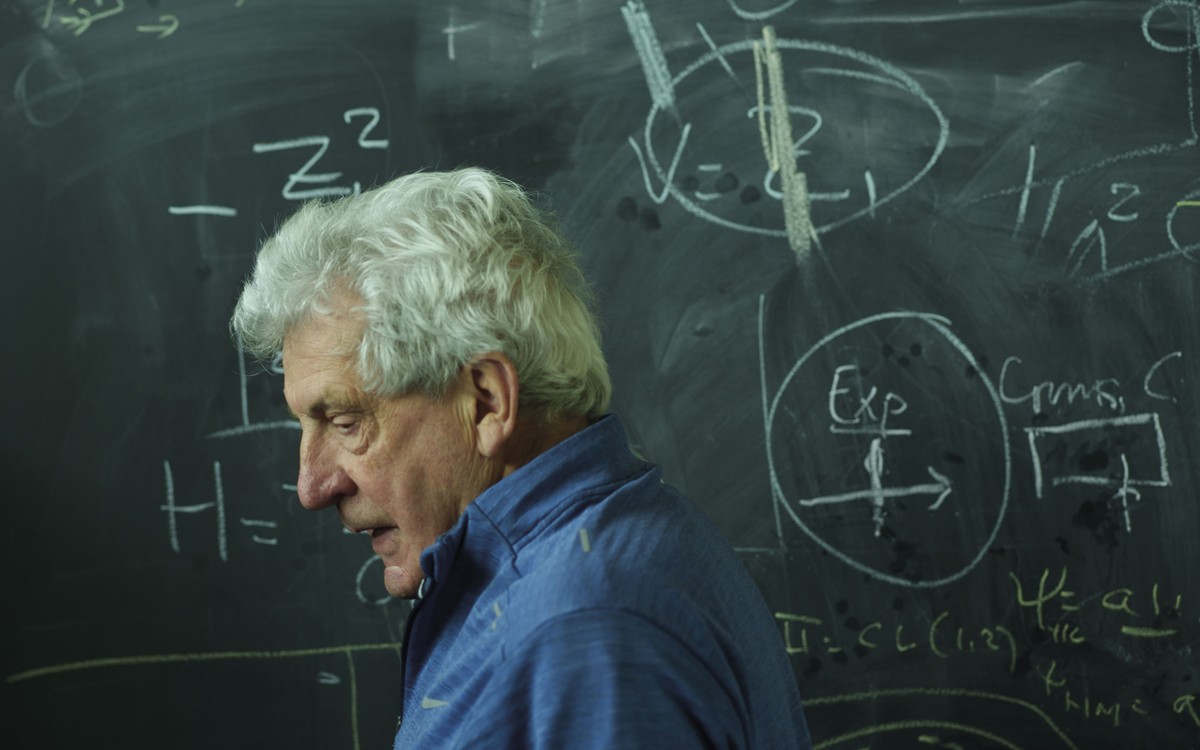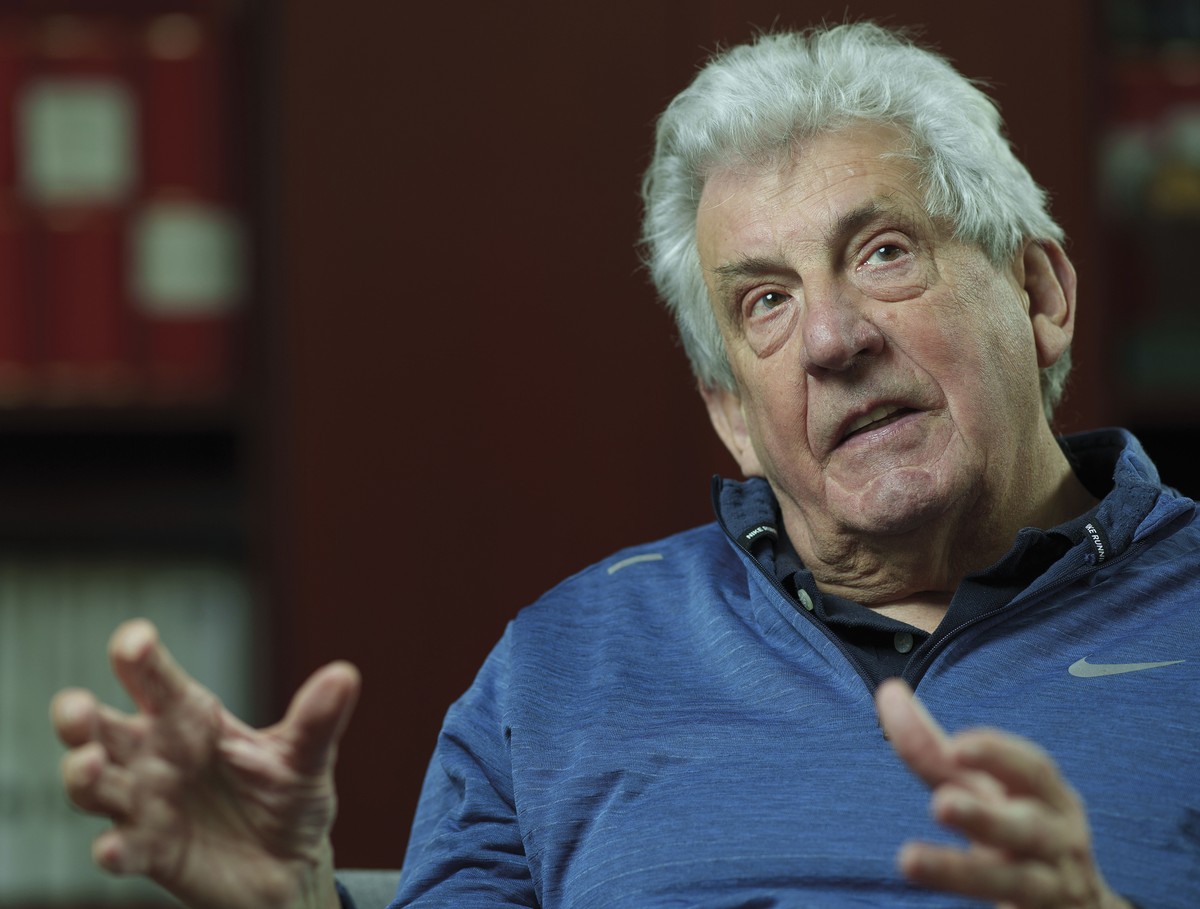“Being a scientist is a privilege, and that implies a responsibility.”
The interview took place in his DIPC office. When the photographer starts working, he excuses himself for his clothes [he is wearing a sweatshirt]: “I didn’t remember we had an interview.” But for the Elhuyar magazine, he says he'll be happy to do it. We spoke English before turning on the recorder. He then answered most of the questions in Spanish, not all of them, however. And he has spoken almost as much about politics, Basque, society and philosophy as he has about science, interspersing numerous quotes and references, fluent and welcoming.

This year is the International Year of Quantum Mechanics. What is quantum to you?
I believe that quantum mechanics is the greatest cultural revolution of the 20th century. Not scientific, huh? ; the cultural. It has changed our way of seeing and understanding nature. it began in 1900 as an act of despair, as Planck himself said. To know the radiation spectrum of the black body, he introduced the idea of discontinuity in physics. Since then, it has evolved. Einstein took the next step with the photoelectric effect, in fact, he said that the radiation is not continuous, it is not a wave, but has corpuscles of light. Then they were called photons. Then comes the structure of the atom and all that. The first revolution was quantum, and I think that’s why the year of quantum is now celebrated. In fact, Heisenberg’s article dates back to 1927 [referring to Heisenberg’s uncertainty principle].
From there comes the second quantum revolution. But in the first revolution there was already the second, and the first is present in the second. Hori bera esan zuen Erwin Schrödingerrek bere inaugurazio-konferentzian, San Agustinen esaldia erabiliz: Novum in Vetere et in Novo Vetus patet. St. Augustine made this statement to link the Old and New Testaments of the Bible, and Schrödinger brought it to quantum. We can say the same today. The possibility of manipulating atoms one by one has brought about the second revolution, but this already existed then, in secret.
I read this phrase to the great Basque philosopher Xabier Zubiri, who studied at the same Planck headquarters in Berlin. Zubiri had knowledge of quantum physics and in his book “Nature, History, God” (Nature, History, God) he mentions Heisenberg and all. He was a man of great culture.
If you weren’t a scientist, what would you be? Or is it an absurd question?
Oh, no, no, no. I would have been brought back by life. It would have been according to the circumstances; in fact, I am curious about many issues. I have never considered myself a predestined physicist. I loved mathematics, history. I wasn’t going to be a musician because I don’t have the ability to do it, but I could have been a lot of things. I've studied physics and I'm happy because it's a great career. It doesn’t just give you a view of the world; it gives you an intellectual structure, a conceptual structure to analyze problems. It's a way of thinking. It's not a technique, it's a system of thought.
Weisskopf, who was the director of Los Alamos, said: “The privilege of being a physicist.” I agree with them. We have the privilege of being scientists, of knowing and understanding. Well, understand, with our limitations; because we don’t know to what extent our brain is able to understand, how far it goes. But we have this privilege, and that implies a responsibility.
Is that what led you to become a politician?
Take a look at this: I have read an article by the great historian of Harvard, Gerald Holton, entitled “Candor and Integrity in Science.” According to him, being a scientist has certain virtues or qualities. The first is to try, with all your efforts, to understand everything that concerns you. The second is not to be stored in the laboratory. The laboratory cannot have a place to hide from the world, but a place to do the work, and it implies an obligation to participate in the world’s problems. Not only to offer resources, but to enter into the discussion and definition of objectives.
We are at the right time to remember the role of the scientist, because Trump has introduced all these laws to hinder the work of scientists. Scientists need to raise their voices and support rationality when it is irrationally attacked.
Science and scientific activity do not have the dogma of truth, and their opinions on many issues are comparable to those of the rest of the population. But when the irrationality rises, they must raise their voice.
Well, right now we don’t live in the best times in that sense...
This juxtu is the time, now that the reason is attacked, to awaken people to germinate and protect them. I’m an optimist in the public; in private, it’s another matter. But the pessimism in the public is sterile. The evolution of humanity, despite all the atrocities we have committed, has always been improved. Any time in the past was worse in health, wealth, dependence on nature. It is true that there are holes in the path from time to time, but on the scale of the centuries, they are small. It could be small too!
Back to scientific activity, among your accomplishments, is there one that makes you particularly proud?
There are some small achievements that are very big for me. For example, I predicted different electronic states on the surfaces of materials that later became instruments for studying electronic dynamics when attosecond lasers arrived. I never thought that there would be instruments to investigate a small thing that I suggested, and then somehow they became drosophila on surfaces to investigate the dynamics of electrons [drosophila or vinegar is one of the most used organisms in genetic research].
I predicted and wrote some equations that explain how an electron loses energy when it moves around a surface, depending on the material, depending on the geometry of the surface... I predicted how fast and even slow ions stop in solids with equations that bear my name... These are small contributions, but they fill me with pride.
I would be able to write some of these equations right now. For example, the easiest, of a plan, I will write to you.
He gets up from the chair and writes the equation on the chalkboard, giving explanations. He then shows the interviewer a series of articles, including one from 1975, co-written with Rufus Ritchie, who was the director of his thesis.
On the dynamics of electrons, we have been leaders with our work here in San Sebastian with my team. That satisfies me.
You mentioned the team. In fact, scientific activity is a collective work.
In general, science is a collective work in two aspects. On the one hand, because you support the previous ones. However, I don’t like the quote that says “on the shoulders of giants.” It is attributed to Newton, but in fact it belongs to a philosopher who lived long before: Bernard from Chartres. Newton used it to underestimate Hooke, who was a hunchback. In other words, I don’t like it very much. Newton needed nothing more to elevate his greatness. Newton is humanity’s greatest talent for what he accomplished and what he left behind, but that doesn’t mean he was as morally superior as he was scientifically.
And, on the other hand, because sometimes the research is done in a group. I have worked a lot in the team; I consider myself a particularly expert in collaboration. If someone says in a workgroup, “I came up with that idea,” they’re not ready to do the work in the group. When someone does the work in the group, the idea is of the group. However, it is true that there are a few individuals who are able to make qualitative leaps: Newton, Einstein, Watson and Crick in biology, Darwin... I always say that the two biggest heads are Newton and Darwin, both from Cambridge.
I also wanted to ask you about the Basque language, which you always remember. Yes,
the Basque language has always attracted me. It's a matter of love, I've always thought of something that's ours. At school, I couldn’t learn Basque, but then I took it upon myself to learn it. And I can’t understand the current obstacles to the development of the Basque language. In these times when the ecology is so protected, the obstacles that some groups in Navarre place on it are hard to understand. In order for the Basque language to survive, in order for it to thrive, it takes enthusiasm. The desire to be Basque.
It was up to me to implement the Law of Normalization of the Use of Basque [which was the first Minister of Education of the Basque Government formed after the Franco regime], and I gladly did so. Now the challenge is the use, but then it was necessary to guarantee that those who wanted to live in Basque could do so freely and efficiently. And this led to obligations, not for the speaker, but for the administration. In some areas it developed well, for example in education; and in others it did not. The courts are a clear example of the latter. But the law must be complied with by all the administrations that exist in the Basque Country; not only here. I mean, the Spanish army should fill it, too, just like the teachers.
The task is still there... And in science, what remains to be done?
We'll never know what's left. I'll never do it. By definition, we can't know what we don't know. We don’t know if our perception of the world coincides with physical reality. The progress of physics is asymptotic. We're getting closer, but there's never a definitive answer. We don't even know if our brain will be able to understand everything. Perhaps now, with artificial intelligence, we will get other ways of knowing and learning.
I'd like to clarify one thing about quantum. In fact, it's been a while since we've been saying we don't understand anything. It’s not true; we understand a lot. We understand, for example, that aluminum is a metal and is a semiconductor, and we also understand why that is. We understand the periodic table... It is true that sometimes it is necessary to determine what we understand by understanding.
In any case, the progress of knowledge has always brought and will bring new questions. And there are moments when qualitative leaps occur. We find things we didn’t know we didn’t know we didn’t know; that’s ignorance inconspicuous. It’s like the spotlight illuminating the clown on the circus track: when the spotlight is very closed, only the clown is visible. We don't even know if there's anything else in the dark. If we widen the focus, we see more things, but at the same time the perimeter of the invisible increases.
Scientists believe in the Ionian spell of Tales of Miletus. In other words, we believe that problems can be solved and that if we try, investigate and ask, we will get an answer. And we will also answer the questions that this will bring us. And that we will come to understand the world that can be understood. It is this faith that drives the scientist. That’s why the scientist is optimistic in nature.
Are you still investigating yourself?
No. No, no, no. My role is to be the Executive Chairman of DIPC. Occasionally, I advise them on electron dimanics and these issues, but I don’t do the calculations anymore. I work mostly in communications. We do a great job in the center. We have four main lines of research: quantum, nano, life and cosmos; and we also have several transversal projects. We have recently published an important work on the origin of life. This is what Juan Manuel García-Ruiz is talking about, and the result comes with a change in the famous Miller experiment.
This lights me up. See what level of researchers we have; also extraordinary from a personal point of view. Here we will have the quantum computer in front of us and, under the direction of Javier Aizpurua, it will make an enormous contribution to our research ecosystem. These things awaken me and give me joy. You see how easily I'm glad...
Buletina
Bidali zure helbide elektronikoa eta jaso asteroko buletina zure sarrera-ontzian













